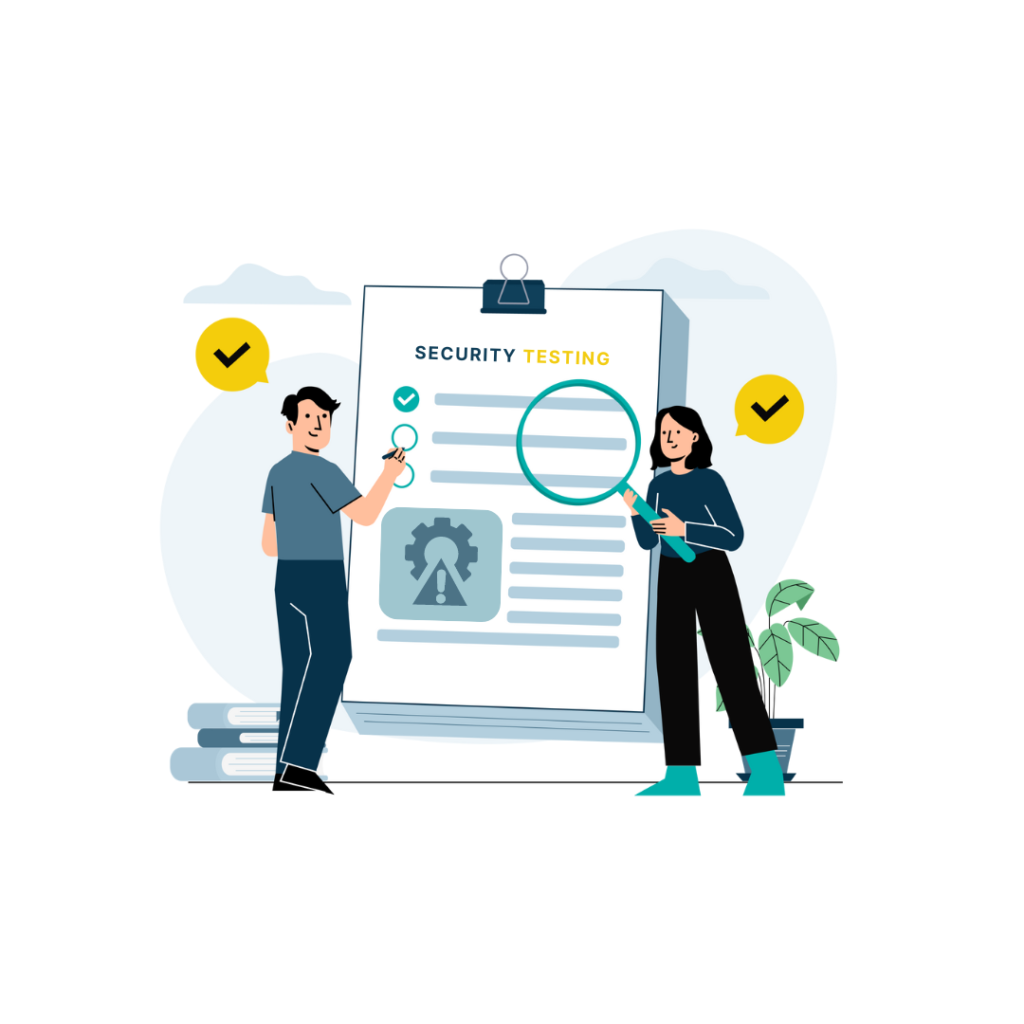Understanding the Importance of Legal and Regulatory Considerations in Risk Management
Amidst the thriving industries of web and app development, managing risk has never been more crucial. In this digital age, where innovation drives progress, legal and regulatory considerations emerge as fundamental components of effective risk management strategies. Adhering to relevant laws is not merely a bureaucratic necessity; it is a safeguard that protects sensitive user data and shields companies from severe financial penalties and potential reputational damage.
Navigating the complexities of legal compliance ensures that businesses not only thrive but also maintain trust and credibility in an increasingly scrutinized market. As technology continues to advance, the ability to proactively manage these risks becomes a cornerstone of sustainable success in the digital realm.
The Critical Role of Compliance in Web and App Development
Compliance plays a vital role in the development of web and app solutions. It acts as a safeguard, ensuring that businesses operate within the bounds of the law and adhere to established standards. This is not just a bureaucratic necessity but a strategic imperative that impacts the longevity and success of digital products.
Why Compliance Matters
Compliance is crucial for several reasons:
- Protection of User Data: In an era where data breaches are increasingly common, protecting user data is paramount. Regulations like the General Data Protection Regulation (GDPR) and the California Consumer Privacy Act (CCPA) mandate stringent data protection measures, ensuring that personal information is handled with the utmost care.
- Avoidance of Legal Penalties: Non-compliance can result in severe penalties, including hefty fines and legal action. For instance, under GDPR, companies can be fined up to €20 million or 4% of their annual global turnover, whichever is higher, for severe violations.
- Building Trust with Users: Users are more likely to trust and engage with platforms that prioritize their privacy and security. Compliance demonstrates a commitment to these values, fostering user loyalty and trust.
- Mitigating Business Risks: Compliance helps identify and mitigate potential risks that could harm the business. This includes financial risks, reputational damage, and operational disruptions.
Integrating Compliance into the Development Process
To ensure compliance, it’s essential to integrate it into every stage of the development process:
- Initial Planning: From the outset, developers and project managers should consider the legal requirements relevant to their project. This includes conducting a thorough risk assessment and identifying potential compliance issues.
- Design and Development: Incorporating privacy by design principles ensures that compliance is built into the product from the ground up. This involves implementing robust security measures and ensuring that data handling processes meet regulatory standards.
- Testing and Deployment: Before launching the product, conduct extensive testing to ensure compliance with all relevant regulations. This includes internal audits and, if necessary, seeking external validation.
- Ongoing Monitoring: Compliance is not a one-time effort but an ongoing process. Regularly monitor the product and update it as necessary to ensure continuous compliance with evolving regulations.
Overview of Key Regulations Impacting Risk Management
Understanding and adhering to the key regulations that impact risk management in web and app development is crucial. Here, we explore some of the most significant regulations:
General Data Protection Regulation (GDPR)
The GDPR, which came into effect in May 2018, is a comprehensive data protection law that applies to all companies processing the personal data of individuals residing in the European Union (EU).
- Scope and Key Provisions: GDPR applies to any organization, regardless of its location, that processes the data of EU residents. Key provisions include the requirement for explicit consent for data processing, the right to data portability, and the obligation to report data breaches within 72 hours.
- Impact on User Data Protection: GDPR has significantly strengthened user data protection, giving individuals more control over their personal information. Companies must ensure they have robust data protection measures in place, including encryption, anonymization, and regular security audits.
California Consumer Privacy Act (CCPA)
The CCPA, effective from January 2020, grants California residents new rights regarding their personal data.
- Essential Requirements: CCPA requires companies to disclose what personal data they collect, how it is used, and with whom it is shared. It also gives consumers the right to access their data, request its deletion, and opt-out of its sale.
- Compliance Strategies: To comply with CCPA, companies must update their privacy policies, implement mechanisms for consumers to exercise their rights, and ensure their data handling practices are transparent and secure.
Health Insurance Portability and Accountability Act (HIPAA)
HIPAA is a U.S. law designed to protect sensitive patient health information.
- Overview of HIPAA Regulations: HIPAA sets national standards for the protection of health information, including the Privacy Rule, which regulates the use and disclosure of Protected Health Information (PHI), and the Security Rule, which sets standards for securing electronic PHI.
- Compliance for Health Apps and Websites: Developers of health apps and websites must ensure that they comply with HIPAA by implementing stringent security measures, such as encryption, access controls, and regular security assessments.
Other Relevant Regulations
In addition to GDPR, CCPA, and HIPAA, there are other regulations that web and app developers must be aware of:
- Children’s Online Privacy Protection Act (COPPA): COPPA imposes certain requirements on websites and online services directed at children under 13 years of age. Compliance includes obtaining verifiable parental consent before collecting personal information from children.
- Australian Privacy Principles (APPs): The APPs are part of the Privacy Act 1988 and provide a framework for handling personal information in Australia. They cover aspects such as the collection, use, and disclosure of personal information, data quality, and security.
Understanding and adhering to legal and regulatory considerations is essential for effective risk management in web and app development. By ensuring compliance, businesses not only protect themselves from legal penalties but also build trust with users and safeguard their data. Integrating compliance into every stage of the development process and staying informed about key regulations are crucial steps in managing risk effectively.
Key Regulations Governing Risk Management in Web and App Development
Navigating the intricate web of legal and regulatory requirements in web and app development is paramount for mitigating risks and fostering user trust. As the digital landscape continually evolves, developers face a multitude of compliance challenges that can significantly impact the success and credibility of their projects. Ensuring adherence to data protection laws, user privacy regulations, and industry standards is not just a legal obligation but a strategic necessity.
By proactively addressing these requirements, developers can safeguard their projects against potential legal pitfalls, build robust security frameworks, and cultivate a trustworthy user experience. This diligent approach not only mitigates risks but also sets the foundation for long-term success and reliability in the competitive world of digital innovation.
General Data Protection Regulation (GDPR)
The General Data Protection Regulation (GDPR) is a pivotal piece of legislation that has reshaped the landscape of data protection globally.
Scope and Key Provisions of GDPR
GDPR applies to any organization that processes the personal data of individuals residing in the European Union (EU), regardless of the company’s location. This broad scope means that even non-EU businesses must comply if they handle EU citizens’ data.
Key provisions of GDPR include:
- Data Processing Principles: Organizations must process data lawfully, transparently, and for a specific purpose. Data minimization and accuracy are also critical principles.
- Rights of Data Subjects: Individuals have enhanced rights, including the right to access their data, correct inaccuracies, and request deletion (the “right to be forgotten”).
- Data Protection Officer (DPO): Certain organizations must appoint a DPO to oversee GDPR compliance.
- Data Breach Notification: Organizations must notify relevant authorities of a data breach within 72 hours and inform affected individuals if the breach poses a high risk to their rights and freedoms.
- Accountability and Governance: Organizations are required to implement measures to ensure and demonstrate compliance, such as data protection impact assessments and maintaining records of processing activities.
GDPR’s Impact on User Data Protection
GDPR has significantly strengthened user data protection, giving individuals more control over their personal information. For businesses, this means implementing robust data protection measures, such as encryption and anonymization, and ensuring transparency in data processing activities.
Organizations must also ensure that third-party vendors comply with GDPR, as they are held accountable for data protection throughout the data lifecycle. Regular audits and updates to privacy policies are necessary to maintain compliance and foster user trust.
California Consumer Privacy Act (CCPA)
The California Consumer Privacy Act (CCPA) sets a high standard for data privacy in the United States, particularly impacting companies that do business with California residents.
Essential Requirements of CCPA
CCPA grants California residents new rights regarding their personal data and imposes obligations on businesses to ensure these rights are upheld.
Key requirements include:
- Disclosure: Businesses must inform consumers about the categories of personal data collected, the purposes for which it is used, and the third parties with whom it is shared.
- Right to Access and Delete: Consumers have the right to request access to their personal data and request its deletion, subject to certain exceptions.
- Opt-Out of Data Sale: Consumers can opt out of the sale of their personal data. Businesses must provide a clear “Do Not Sell My Personal Information” link on their websites.
- Non-Discrimination: Businesses cannot discriminate against consumers who exercise their CCPA rights, such as by providing different services or prices.
Compliance Strategies for CCPA
To comply with CCPA, businesses should:
- Update Privacy Policies: Ensure that privacy policies are clear, transparent, and comprehensive, detailing consumer rights and how they can be exercised.
- Implement Consumer Rights Mechanisms: Establish processes for handling consumer requests for data access, deletion, and opt-out, including verification procedures.
- Data Inventory and Mapping: Conduct a thorough data inventory to understand what personal data is collected, how it is used, and where it is stored.
- Employee Training: Train employees on CCPA requirements and how to handle consumer requests appropriately.
Health Insurance Portability and Accountability Act (HIPAA)
HIPAA sets national standards for the protection of health information in the United States, particularly impacting developers of health apps and websites.
Overview of HIPAA Regulations
HIPAA encompasses several rules that protect sensitive patient information:
- Privacy Rule: Regulates the use and disclosure of Protected Health Information (PHI), ensuring that individuals’ health information is protected while allowing the flow of health data needed to provide high-quality health care.
- Security Rule: Sets standards for securing electronic PHI (ePHI) through administrative, physical, and technical safeguards.
- Breach Notification Rule: Requires covered entities to notify affected individuals, the Secretary of Health and Human Services (HHS), and, in some cases, the media, of breaches of unsecured PHI.
HIPAA Compliance for Health Apps and Websites
Developers of health apps and websites must take specific steps to ensure HIPAA compliance:
- Data Encryption: Implement encryption protocols to protect ePHI during transmission and storage.
- Access Controls: Establish strict access controls to ensure that only authorized individuals can access ePHI.
- Audit Controls: Implement mechanisms to record and examine access and activity in information systems containing ePHI.
- Employee Training: Provide comprehensive training for employees on HIPAA requirements and best practices for protecting health information.
Other Relevant Regulations
Beyond GDPR, CCPA, and HIPAA, several other regulations are critical for web and app developers to understand and comply with.
Children’s Online Privacy Protection Act (COPPA)
COPPA imposes specific requirements on websites and online services directed at children under 13 years of age.
- Parental Consent: Obtain verifiable parental consent before collecting personal information from children.
- Privacy Policies: Post a clear and comprehensive online privacy policy describing information practices for children’s personal information.
- Data Minimization: Limit the collection of personal information to what is reasonably necessary for the child’s participation in the activity.
Australian Privacy Principles (APPs)
The APPs, part of the Privacy Act 1988, govern the handling of personal information in Australia.
- Collection of Personal Information: Only collect personal information that is necessary for the organization’s functions or activities and do so by lawful and fair means.
- Use and Disclosure: Only use or disclose personal information for the primary purpose of collection, unless an exception applies.
- Data Security: Take reasonable steps to protect personal information from misuse, interference, loss, unauthorized access, modification, or disclosure.
Best Practices for Achieving Compliance in Web and App Development
Navigating the rapid evolution of web and app development demands a steadfast commitment to upholding legal and regulatory standards. By prioritizing compliance, developers safeguard user data integrity, mitigate legal risks, and cultivate a foundation of trust with their user base. This proactive approach not only ensures adherence to stringent guidelines but also underscores a commitment to ethical practices and user-centric security measures. Embracing compliance as a cornerstone of development strategy not only fortifies legal defenses but also enhances brand reputation, positioning developers as stewards of user privacy and integrity in the digital landscape.
Integrating Compliance into the Development Lifecycle
Integrating compliance into every stage of the development lifecycle is essential for creating secure and trustworthy digital products. This proactive approach ensures that compliance is built into the foundation of your project rather than being an afterthought.
Initial Risk Assessment and Compliance Planning
The first step in integrating compliance is conducting an initial risk assessment and developing a comprehensive compliance plan.
- Identify Relevant Regulations: Determine which regulations apply to your project based on the type of data you will handle, the geographical location of your users, and the industry standards. This could include GDPR, CCPA, HIPAA, COPPA, or others.
- Conduct a Risk Assessment: Identify potential risks associated with data handling and processing. Evaluate the likelihood and impact of these risks on your project.
- Develop a Compliance Plan: Based on the risk assessment, create a detailed compliance plan that outlines the steps your team will take to adhere to relevant regulations. This plan should include timelines, responsibilities, and specific compliance requirements.
Implementing Privacy by Design
Privacy by Design is a proactive approach that incorporates data protection principles into the design and development process from the outset.
- Embed Privacy into Design: Ensure that privacy and data protection are fundamental parts of the design process. This includes implementing data minimization strategies, such as collecting only the data that is necessary for the intended purpose.
- Default Settings: Configure default settings to provide the highest level of privacy protection. For example, data sharing options should be set to “off” by default.
- User Consent and Control: Design interfaces that make it easy for users to understand and control their data. This includes clear consent forms, user-friendly privacy settings, and accessible options for users to manage their data.
- Continuous Improvement: Regularly review and update privacy measures to address emerging threats and changes in regulations. This ensures that privacy protection remains effective throughout the product’s lifecycle.
Regular Audits and Monitoring for Continuous Compliance
Compliance is not a one-time task but an ongoing process. Regular audits and continuous monitoring are critical to ensure that your web and app development practices remain compliant with evolving regulations.
Conducting Internal and External Audits
Audits are essential for evaluating the effectiveness of your compliance measures and identifying areas for improvement.
- Internal Audits: Conduct regular internal audits to assess your compliance with established policies and procedures. This involves reviewing data handling practices, security measures, and user consent processes. Internal audits help in identifying potential gaps and addressing them proactively.
- External Audits: Engage third-party auditors to conduct external audits. These auditors provide an objective assessment of your compliance status and offer insights into best practices. External audits are particularly valuable for gaining certification or validation from regulatory bodies.
- Documentation and Reporting: Maintain detailed documentation of audit findings, corrective actions taken, and ongoing compliance efforts. This documentation is crucial for demonstrating compliance during regulatory inspections and audits.
Monitoring Regulatory Updates and Adapting Accordingly
Regulations governing web and app development are continually evolving. Keeping up with these changes is vital to maintaining compliance.
- Stay Informed: Subscribe to updates from regulatory bodies, industry groups, and legal experts. Attend relevant conferences, webinars, and training sessions to stay abreast of new regulations and compliance trends.
- Regular Policy Reviews: Periodically review and update your privacy policies, terms of service, and data handling practices to reflect regulatory changes. Ensure that your team is aware of these updates and understands their implications.
- Adapt Quickly: Implement changes swiftly to adapt to new regulations. This may involve updating your software, modifying data collection practices, or enhancing security measures. Ensure that these changes are communicated clearly to your users.
How Legal Teams Contribute to Effective Risk Management
Legal teams play a crucial role in the success of web and app development projects by ensuring compliance with laws and regulations, mitigating legal risks, and protecting the interests of the organization.
Legal Guidance During the Development Phase
Legal guidance is integral throughout the development lifecycle, from the initial planning stages to deployment and beyond. Legal professionals provide expertise that helps developers navigate complex legal landscapes and ensure that projects meet regulatory requirements.
Drafting and Reviewing Legal Documents
One of the primary responsibilities of legal teams is drafting and reviewing legal documents that govern the development process.
- Privacy Policies and Terms of Service: Legal teams draft privacy policies and terms of service that outline how user data will be collected, used, and protected. These documents are crucial for establishing transparency and building trust with users.
- Contracts with Third-Party Vendors: Legal professionals review contracts with third-party vendors to ensure compliance with legal standards and protect the organization’s interests. This includes negotiating terms related to data security, intellectual property rights, and liability.
Ensuring Contractual Compliance
Legal teams ensure that all parties involved in the development process adhere to contractual obligations and legal requirements.
- Monitoring Compliance: Legal professionals monitor compliance with contractual agreements throughout the project lifecycle. They verify that all parties fulfill their obligations and address any breaches promptly.
- Enforcement of Legal Rights: In case of contractual disputes or breaches, legal teams take appropriate legal action to enforce the organization’s rights and seek remedies.
Collaboration Between Legal and Technical Teams
Effective collaboration between legal and technical teams is essential for aligning legal requirements with technical capabilities and project goals.
Effective Communication Strategies
Communication between legal and technical teams ensures that legal requirements are understood and integrated into the development process.
- Clear Communication Channels: Establish clear communication channels between legal and technical teams to facilitate timely exchange of information and feedback.
- Educating Technical Teams: Legal professionals educate technical teams about legal requirements relevant to their work, such as data protection laws and intellectual property rights. This enables developers to make informed decisions and implement compliant solutions.
Joint Risk Assessment and Mitigation Plans
Collaborative risk assessment and mitigation planning help anticipate potential legal risks and implement proactive measures to address them.
- Identifying Legal Risks: Legal and technical teams conduct joint risk assessments to identify legal risks associated with data privacy, intellectual property, regulatory compliance, and contractual obligations.
- Developing Mitigation Strategies: Based on the risk assessment, teams develop mitigation strategies to reduce legal exposure. This may include adjusting development practices, enhancing security measures, or modifying contractual terms to minimize risks.
Strategies for Safeguarding User Data and Ensuring Privacy
Safeguarding user data and ensuring privacy in web and app development requires a multi-faceted approach that integrates strong encryption practices, secure data storage solutions, transparent data practices, and user-centric consent mechanisms. By implementing these strategies, businesses not only comply with legal requirements but also foster trust and loyalty among their user base.
Data privacy is an ongoing commitment that requires continuous vigilance, adaptation to regulatory changes, and investment in robust security measures. By prioritizing user privacy and adopting a proactive stance towards data protection, businesses can differentiate themselves in the competitive digital landscape while safeguarding user trust and confidentiality.
Data Encryption and Secure Storage Solutions
Data encryption and secure storage are fundamental pillars of data protection, ensuring that sensitive information remains confidential and inaccessible to unauthorized parties.
Implementing Advanced Encryption Standards
Advanced Encryption Standards (AES) are widely recognized as a secure method for encrypting data both at rest and in transit.
- Encryption Algorithms: Implement AES-256, a symmetric encryption algorithm widely regarded for its robust security. AES-256 encrypts data using a 256-bit key, making it extremely difficult to decrypt without the corresponding key.
- End-to-End Encryption: Utilize end-to-end encryption (E2EE) for transmitting sensitive data. E2EE ensures that data is encrypted on the sender’s device and decrypted only on the recipient’s device, minimizing the risk of interception during transmission.
- Data Masking: Employ data masking techniques to protect sensitive data fields. This involves replacing sensitive data with anonymized or pseudonymized values, maintaining data usability while reducing exposure.
Secure Data Storage Practices
Securely storing data is as crucial as encrypting it during transmission.
- Access Controls: Implement stringent access controls to ensure that only authorized personnel can access sensitive data. Use role-based access controls (RBAC) and multi-factor authentication (MFA) to enhance security.
- Data Segregation: Segregate sensitive data into separate databases or storage environments with different access levels. This minimizes the impact of a data breach by limiting the exposure of sensitive information.
- Regular Security Audits: Conduct regular security audits and vulnerability assessments to identify and mitigate potential security weaknesses in data storage systems.
User Consent and Transparent Data Practices
Respecting user privacy rights and maintaining transparent data practices are essential for building user trust and complying with privacy regulations.
Obtaining and Managing User Consent
Obtaining explicit consent from users before collecting and processing their personal data is a fundamental principle of data privacy laws.
- Clear Consent Mechanisms: Implement clear and granular consent mechanisms that inform users about what data is being collected, why it is needed, and how it will be used.
- Preference Management: Provide users with easy-to-use preference management tools that allow them to modify their consent preferences at any time. This includes opting in or out of specific data processing activities.
- Documenting Consent: Maintain records of user consent to demonstrate compliance with regulatory requirements. Document the date, time, and method by which consent was obtained to ensure transparency.
Transparency in Data Collection and Usage
Transparency is key to building trust with users and demonstrating commitment to ethical data practices.
- Privacy Policies: Publish clear and comprehensive privacy policies that outline how user data is collected, used, and protected. Ensure that privacy policies are easily accessible and written in plain language.
- Data Usage Notifications: Notify users about any changes in data collection or usage practices. Provide timely notifications and seek re-confirmation of consent if significant changes are made.
- User Education: Educate users about data privacy and security best practices. Provide tips on safeguarding their own data and encourage them to review and manage their privacy settings regularly.
Lessons from Compliance Failures in the Tech Industry
Compliance with legal and regulatory standards is paramount for businesses in the tech industry to protect user data, maintain trust, and avoid severe consequences. This section examines notable compliance breaches and the legal and financial repercussions that ensued, offering valuable lessons for all organizations.
Case Studies of Notable Compliance Breaches
Examining past compliance breaches provides insights into the repercussions of inadequate data protection measures and regulatory non-compliance.
Facebook-Cambridge Analytica Scandal
The Facebook-Cambridge Analytica scandal, which unfolded in 2018, remains one of the most significant data privacy breaches in recent history.
- Incident Overview: Cambridge Analytica, a political consulting firm, harvested the personal data of millions of Facebook users without their consent through a third-party app. This data was then used for targeted political advertising during the 2016 US presidential election.
- Legal and Regulatory Fallout: The incident sparked investigations by regulatory authorities worldwide, including the US Federal Trade Commission (FTC) and the UK Information Commissioner’s Office (ICO). Facebook faced allegations of failing to protect user data and being transparent about how it was used.
- Consequences: Facebook agreed to pay a record $5 billion fine to settle FTC charges of privacy violations. The scandal tarnished Facebook’s reputation, leading to increased scrutiny of its data handling practices and calls for stricter data privacy regulations globally.
Marriott Data Breach
In 2018, Marriott International suffered a massive data breach affecting approximately 500 million guests.
- Incident Overview: Hackers gained unauthorized access to Marriott’s Starwood guest reservation database, compromising sensitive personal information such as names, passport numbers, and payment card details over several years.
- Legal and Regulatory Fallout: Marriott faced investigations from multiple data protection authorities, including fines under the European Union’s General Data Protection Regulation (GDPR) due to its global reach. Authorities scrutinized Marriott’s data security practices and response to the breach.
- Consequences: Marriott incurred significant financial costs associated with breach response, legal fees, and settlements with affected individuals. The breach damaged Marriott’s reputation for data security and customer trust, highlighting the importance of robust cybersecurity measures.
Legal and Financial Repercussions of Non-Compliance
Non-compliance with data protection regulations can lead to severe penalties, financial losses, and long-term damage to reputation and user trust.
Fines and Penalties
Regulatory bodies impose fines and penalties on organizations that fail to protect user data or violate privacy regulations.
- GDPR Fines: Under GDPR, fines can be substantial, reaching up to 4% of annual global turnover or €20 million, whichever is higher, for the most serious infringements. Organizations may also face additional penalties for failure to comply with data subject rights, data breaches, or inadequate security measures.
- FTC Enforcement Actions: In the United States, the FTC can impose fines and require organizations to implement comprehensive data security programs following data breaches or privacy violations. Fines are intended to deter future non-compliance and compensate affected individuals.
Long-term Impact on Reputation and User Trust
Beyond financial penalties, compliance failures can severely damage an organization’s reputation and erode customer trust.
- Loss of Customer Confidence: Data breaches and privacy scandals can lead to customer disillusionment and a loss of trust in the affected organization. Customers may choose to discontinue using services or switch to competitors perceived as more secure.
- Reputational Damage: Negative media coverage and public scrutiny following compliance breaches can tarnish an organization’s reputation, impacting its brand image and market value over the long term.
- Business Disruption: Legal battles, regulatory investigations, and remediation efforts following compliance failures can disrupt business operations and divert resources from core activities.
The lessons learned from notable compliance breaches in the tech industry underscore the importance of prioritizing data protection and regulatory compliance. Organizations must implement robust cybersecurity measures, respect user privacy rights, and maintain transparency in data practices to mitigate risks and build trust.
By learning from past mistakes and understanding the legal and financial repercussions of non-compliance, businesses can proactively enhance their data security frameworks and compliance programs. Investing in comprehensive data protection strategies not only protects against regulatory sanctions but also strengthens customer relationships and enhances organizational resilience in an increasingly data-driven world.
Ultimately, compliance with data protection regulations is not just a legal obligation but a strategic imperative for safeguarding sensitive information, preserving reputation, and fostering sustainable growth in the digital age.
Conclusion
In conclusion, navigating legal and regulatory considerations in risk management requires diligence, expertise, and a commitment to ethical practices. By prioritizing compliance, businesses not only mitigate legal risks but also enhance their reputation as trustworthy stewards of user data. Embracing these principles fosters a resilient organizational framework capable of adapting to evolving regulatory landscapes while delivering secure, user-centric digital experiences.
In essence, legal and regulatory considerations are integral to fostering a secure digital ecosystem where user privacy is protected, legal obligations are met, and business operations thrive with integrity and resilience.
About SoftwareSeni.
SoftwareSeni is software solutions with more than 10 years of expertise, with 200+ professional staff and more than 1200 projects delivered. SoftwareSeni empowers diverse industries – automotive, real estate, healthcare, education, F&B, hospitality, tourism, and more. We specialise in WordPress, Laravel, Node.js, React.js, NET. SoftwareSeni services include ecommerce website development, web app creation, mobile app development (Android & iOS), and developer team extension.
Why Choose SoftwareSeni?
1. Tailored Services to Suit Your Needs
We understand that every business has unique digital needs. With a range of customizable services, from Team Extension and Staff Augmentation to MVP Development, Custom Software Development, and Web, Mobile (Android & iOS) App, and E-commerce Development, we are ready to support your digital business transformation. Learn more about SoftwareSeni’s services
2. Solutions for Various Industries
We have extensive experience across various industries, including property, retail, automotive, media, healthcare, and more. Our diverse services enable us to be a trusted partner that can provide the right solutions for your industry needs. Learn more about SoftwareSeni’s solutions
3. Experienced Professional Team
With over 200 dedicated professional staff, we are ready to help you tackle every digital challenge. Our experience in managing over 1200 projects ensures that you get the best results from our team. Learn more about SoftwareSeni.
4. Trusted by Many Large Companies
Leading companies such as Astra Motor, Downsizing, RedBalloon, News.com.au, and many others have entrusted their digital transformation to us. Our experience in working with various large companies demonstrates our ability to deliver high-quality solutions. Learn more about SoftwareSeni’s portfolio
5. Commitment to Security and Quality
Security is our top priority. With ISO 27001 certification and being an official AWS Consulting Partner, we ensure that every project is developed to the highest security and quality standards. You can rest assured knowing that your digital systems are in good hands. Learn more about SoftwareSeni’s Commitment to Security
Join Us and Transform Your Business!
Don’t let your business fall behind in this digital era. Choose SoftwareSeni as your digital partner and enjoy services tailored to your needs, supported by a professional team, as well as reliable and secure solutions. Contact us today and start your digital journey confidently.












